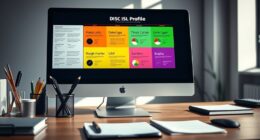To ace your internal interview and secure that promotion, leverage your existing knowledge of the company and its culture. Treat this interview with the same seriousness as an outside opportunity. Prepare by documenting your achievements using the STAR method, focusing on measurable results that align with the new role's requirements. Engage with colleagues to understand team dynamics and desired traits. Clearly express your motivation for the shift and how your past contributions relate to the new position. With these strategies, you'll enhance your candidacy and present yourself as the ideal fit for the role. There's more ahead about making an impact!
Key Takeaways
- Thoroughly research the job requirements and align your experiences to demonstrate role-specific qualifications effectively.
- Document your achievements using the STAR method to showcase quantifiable metrics relevant to the new position.
- Engage in informal conversations with coworkers to gain insights into team dynamics and company culture.
- Clearly articulate your motivation for the transition, linking past contributions to the desired role.
- Follow up with a thank-you email and request feedback to show professionalism and a commitment to growth.
Understanding Internal Interviews

When you're preparing for an internal interview, it's vital to understand how it differs from traditional job interviews. As an internal candidate, you've already established a relationship with the company, which can work to your advantage. You won't need to go through preliminary screenings, allowing hiring managers to dive straight into role-specific questions that assess your qualifications for the job.
In these interviews, your familiarity with the company culture plays an important role. Hiring managers want to see how well you can integrate into the new team, so highlighting your experience and understanding of the company's values is key. You should tailor your cover letter and resume to demonstrate your relevant experience and accomplishments that align with the new role.
Treat internal interviews with the same rigor as external ones. Prepare thoroughly by documenting your past successes and articulating your value proposition for this promotion. Engaging with colleagues and networking within the company can also provide valuable insights into the expectations and traits that the new position demands. Showcasing your commitment to professional development will further solidify your case as the best candidate for the job. Additionally, emphasizing your leadership skills can set you apart as a candidate who not only fits the role but also contributes to the company's vision and growth.
Preparation Strategies

To prepare for your internal interview, start by researching the job requirements from an outsider's perspective. Make sure to document your past achievements, focusing on quantifiable results that showcase your value for the new role. This combination of understanding the position and highlighting your strengths will set you up for success.
Research Job Requirements
Preparing for an internal interview hinges on understanding the job requirements. Start by thoroughly reviewing the job description to identify the key responsibilities and skills required for the role. This will allow you to align your experiences with what the hiring manager expects.
Don't underestimate the power of networking. Connect with coworkers in the department to gather insights into the role's day-to-day functions and the qualities they value in a candidate. This knowledge can help you emphasize the right points in your interview responses.
Additionally, familiarize yourself with the company's goals and initiatives related to the new position. This understanding will enable you to articulate how your skills and experiences contribute to department success, showcasing your commitment to the organization's objectives.
As you prepare, think about your career aspirations and how this role fits into your path. Engage in informal conversations with potential colleagues to gauge team dynamics and culture, which are essential for demonstrating cultural fit during the interview process. By effectively researching job requirements and leveraging your network, you'll be well-equipped to make a compelling case for your promotion.
Document Past Achievements
Throughout your career, documenting your past achievements is essential for showcasing your qualifications during an internal interview. By quantifying successes with specific metrics—like sales increases or project completion times—you provide concrete evidence of your contributions. This approach not only highlights relevant accomplishments but also demonstrates your readiness for the new role.
To strengthen your case for promotion, keep a running list of achievements that you can tailor to reflect the skills and experiences directly related to the new position. During the promotion process, it's vital to articulate these documented achievements effectively. Using the STAR method (Situation, Task, Action, Result) can help you convey the impact of your work and enhance your interview responses.
When preparing for your internal interview, focus on how your documented achievements align with the job requirements. This alignment reveals your capability and commitment to the company's goals. Remember, showcasing your accomplishments with specific metrics not only sets you apart but also reinforces your suitability for the promotion. Additionally, consider how demonstrating your topical authority can further enhance your application by showcasing your expertise in relevant areas. So, start documenting and tailor your achievements today to make a compelling case for your advancement!
Key Interview Questions

When it comes to key interview questions for internal candidates, you'll want to focus on evaluating your professional journey and motivation for the change. Understanding how you align with the company's culture is essential, as it speaks to your fit within the team. By preparing thoughtful responses, you can showcase your strengths and readiness for the new role. Additionally, consider discussing how your experience with financial planning during challenging times can contribute to your new position and benefit the organization.
Assessing Professional Journey
Understanding your professional journey is essential during an internal interview, as it allows you to showcase your growth and achievements within the company. When evaluating your professional journey, be prepared to discuss key milestones and specific skills that highlight your development. Internal hiring managers want to see quantifiable results from your past experience, so come equipped with examples that demonstrate your contributions.
Reflect on the challenges you've faced and share the lessons learned from those experiences. This not only illustrates your resilience but also shows how you've adapted in alignment with the company culture. As you articulate your career trajectory, focus on how each step has prepared you for this new role.
Consider how your experiences align with the goals of the position you're vying for, emphasizing your fit within the organization's mission and values. This clarity will enhance your appeal as an internal candidate during your promotion interview. Being able to connect your past successes to future potential can greatly strengthen your case for advancement. Remember, showcasing your journey is about proving that you're not just ready for the next step, but that you're the best choice for it. Additionally, reflecting on your journey can help you overcome imposter syndrome, as it allows you to recognize and celebrate your achievements confidently.
Motivation for Transition
During your internal interview, articulating your motivation for changing to a new role is essential for demonstrating your commitment to growth within the organization. Start by clearly stating why you're interested in the new position. Connect it to your personal growth and how it aligns with your career aspirations. This shows you're not just looking for a change but are focused on how the role can help you contribute more significantly to the company.
Be prepared to share specific experiences that sparked your interest in moving. This proactive approach highlights your dedication to your professional journey. As you discuss your past contributions, emphasize how they relate to the desired position. This provides concrete evidence of your value while showcasing your commitment to the organization.
Understanding the department dynamics is vital. Express enthusiasm for the goals of the new team, and frame your motivation within the context of how you can support those objectives. Remember these interview tips: clarity, confidence, and alignment with company goals will resonate well with interviewers. By effectively communicating your motivation, you'll strengthen your case for promotion and demonstrate your readiness for the new challenges ahead.
Cultural Fit Evaluation
Evaluating your cultural fit is essential in internal interviews, as it reveals how well you align with the team and company culture. Cultural fit questions often focus on your values, work style, and how you handle collaboration and conflict within the existing team dynamics. Hiring managers want to hear specific examples from your past experiences that showcase your adaptability and compatibility with the company's mission and values.
As an internal candidate, you have the advantage of familiarity with the company culture. Use this to your benefit by providing instances where you've positively impacted team cohesion and morale. Highlight moments where you've successfully navigated challenges, demonstrating your deep understanding of team dynamics and the importance of alignment with the organization's goals. Engaging in open communication can also help ensure that any frustrations or conflicts are addressed constructively, fostering a healthier work environment.
Before the interview, familiarize yourself with the desired traits for the new role. This knowledge will help you tailor your responses to cultural fit questions, emphasizing your alignment with the team's expectations. Remember, your established relationships can play a significant role in illustrating your commitment to fostering a positive work environment. Showing how you'll contribute to team cohesion will resonate with your hiring manager and strengthen your candidacy for the promotion.
Impact of Internal Promotions

Internal promotions can make a remarkable difference in employee retention rates, with those promoted being 41% more likely to stick around compared to their non-promoted peers. When you're recognized for your hard work, it boosts your motivation and engagement, creating a culture of growth within the organization.
Familiarity with company operations reduces onboarding time, making changes smoother. Promoting from within not only showcases commitment to employee development but also enhances overall workplace morale. When you see clear pathways for advancement, it inspires you and your colleagues to aim for success.
Here's a quick overview of the impact of internal promotions:
| Benefit | Description | Impact on You |
|---|---|---|
| Employee Retention | 41% more likely to stay | Job security |
| Reduced Onboarding Time | Familiarity speeds up change | Less stress |
| Enhanced Workplace Morale | Shows commitment to growth | Positive environment |
| Increased Productivity Levels | Understanding of company culture boosts output | Greater efficiency |
| Clear Advancement Pathways | Encourages personal and professional growth | Career progression |
Embracing internal promotions can transform your workplace experience and set the stage for long-term success. Additionally, fostering a culture of growth can lead to improved employee satisfaction and performance.
Post-Interview Actions

After an internal interview, your actions can greatly impact your chances of landing the position. First things first, send a thank-you email within 24 hours. This simple gesture demonstrates professionalism and reinforces your interest in the role. In your email, express appreciation for the opportunity and briefly highlight how your skills align with the position. This can leave a lasting, positive impression.
Next, don't hesitate to request feedback on your interview performance. This shows your commitment to personal development and can provide valuable insights for future opportunities. You'll gain a clearer understanding of what you did well and where you can improve.
Maintaining open communication with the interviewers is key. Check in on the hiring timeline to stay engaged and informed about the next steps. This keeps you on their radar and shows your enthusiasm for the role.
Finally, take some time to reflect on the lessons learned during the interview experience. This reflection can enhance your readiness for subsequent internal applications and help you better prepare for future opportunities. Additionally, consider how your skills could contribute to estate planning in your department, as this may resonate with the interviewers. By following these steps, you'll position yourself as a strong contender for the promotion you desire.
Tips for Success

To succeed in your internal interview, it's crucial to align your experiences with the job description. This means clearly connecting your past accomplishments to the responsibilities and skills required for the new role. Here are three tips to help you shine:
- Engage with Colleagues: Talk to team members in the department you're applying to. This gives you informal insights that help tailor your responses to what they value most in a candidate.
- Use the STAR Method: Structure your answers to behavioral questions using the Situation, Task, Action, Result format. This showcases your problem-solving abilities and highlights your leadership skills effectively.
- Communicate Your Fit: Articulate your understanding of the company culture and how your experiences align with its mission. This shows not only your commitment but also your professional development in your current role.
Don't forget to follow up with a thoughtful thank-you email after your interview. Reiterate your enthusiasm for the position and ask for feedback. This fosters a mindset of continuous improvement and keeps you in the hiring manager's thoughts. Good luck!
Navigating Challenges

Maneuvering the challenges of an internal interview can feel intimidating, especially when biases from hiring managers come into play. To successfully navigate this landscape, you'll need to showcase your unique qualifications and adaptability. Here's how to tackle these challenges effectively:
| Challenge | Strategy |
|---|---|
| Biases from hiring managers | Highlight unique qualifications |
| Disappointment from setbacks | Cultivate emotional resilience |
| Ambiguity in job responsibilities | Seek informal feedback |
| Past rejections | Focus on improvement |
| Demonstrating readiness | Articulate growth and resilience |
Seize this opportunity to gather insights from colleagues about team dynamics and expectations. By actively seeking feedback, you'll not only gain clarity but also signal your commitment to improvement. Remember, addressing any previous setbacks with a focus on learning and resilience is key. Additionally, consider how pet therapy can enhance your emotional well-being during this stressful process.
Finally, understand the specific reasons you were passed over before, and use that information to motivate your pursuit of future opportunities within the organization. By demonstrating your adaptability and readiness for new responsibilities, you'll position yourself as a strong candidate for promotion.
Frequently Asked Questions
How to Ace an Internal Promotion Interview?
To ace an internal promotion interview, start by researching the new role's requirements. Tailor your preparation to highlight relevant experiences. Use the STAR method for behavioral questions, showcasing your problem-solving abilities. Connect with colleagues in the new department to learn about team dynamics and necessary traits. Be ready to discuss your growth in the company and how it prepares you for the new challenges. Finally, send a thank-you email post-interview to express gratitude and interest.
What Questions to Ask Internal Promotion?
Think of your internal promotion interview like maneuvering through a maze. You need to ask the right questions to find your way. Inquire about the team's specific goals and challenges to align your skills. Ask about the key performance indicators that matter most to the hiring manager. Request insights into professional development opportunities and how the role collaborates with other departments. Finally, clarify expectations for your first 90 days to chart your course for success.
What Are ACE Interview Questions?
ACE interview questions focus on three key areas: Alignment, Competencies, and Experience. You'll need to demonstrate how your values align with the company's goals, showcase relevant skills for the role, and provide examples of past successes. When answering, use the STAR method to structure your responses effectively. This approach helps you clearly articulate situations you've faced, the tasks at hand, the actions you took, and the positive results that followed.
What Questions Should an Internal Candidate Ask?
As an internal candidate, you should ask questions that clarify the job's responsibilities and team dynamics. Inquire about the department's goals and challenges to show how your skills align. You might also want to understand the team culture and values to assess your fit. Don't hesitate to ask about professional development opportunities and the performance metrics used to gauge success. This illustrates your commitment and proactive approach to excelling in the role.
Conclusion
As you step into the spotlight of your internal interview, remember that each question is a stepping stone on your path to promotion. With preparation as your compass and confidence as your shield, you can turn challenges into opportunities. Embrace the journey, and let your passion and skills shine like stars in the night sky. After the interview, follow up with gratitude, ensuring you leave a lasting impression. You've got this—now go seize that opportunity!
Felicity, our Author, pens in-depth articles and guides that delve into the heart of personal discovery. Her narrative-driven approach weaves together theory, practice, and personal anecdotes, making the journey of self-exploration both relatable and inspiring. Felicity’s contributions help illuminate the path for those seeking a deeper understanding of themselves and their relationships.










